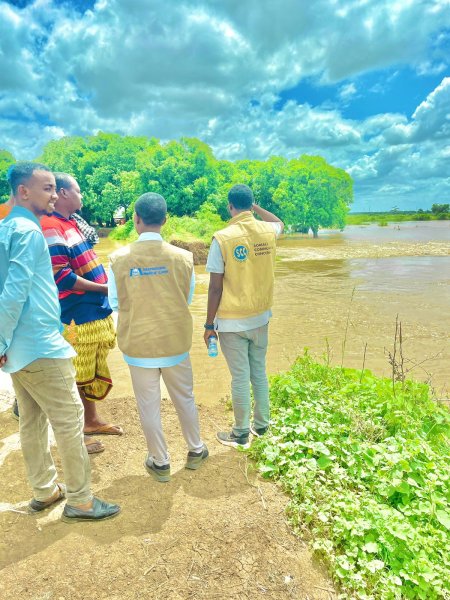Environment & Climate Change

ENVIRONMENTAL AND CLIMATE IN SOMALIA
INTRODUCTION:
Environmental justice is a critical aspect of sustainable development, ensuring fair and equitable access to ecological resources and the fair distribution of environmental benefits and burdens. This report provides an overview of the current state of environmental justice in Somalia, focusing on key issues, challenges, and potential strategies for improvement.
BACKGROUND:
Somalia, located in the Horn of Africa, faces numerous environmental challenges, including deforestation, desertification, land degradation, water scarcity, and vulnerability to climate change. These challenges are further compounded by political instability, conflict, and limited institutional capacity, making it crucial to address environmental justice concerns within the country.
KEY ISSUES:
A. Access to Clean Water: Many communities in Somalia lack access to clean and safe drinking water, leading to waterborne diseases and health issues. Disparities in water access exacerbate existing inequalities, with marginalized groups, such as women and rural populations, disproportionately affected.
B. Land Ownership and Resource Distribution: Land disputes and conflicts over natural resources, including grazing lands and farmland, are common in Somalia. Historically, marginalized communities have faced challenges in securing land rights, leading to displacement and further marginalization.
C. Climate Change Vulnerability: Somalia is highly vulnerable to climate change impacts, including increased drought frequency, sea-level rise, and extreme weather events. These changes disproportionately affect vulnerable populations, exacerbating existing socio-economic disparities.
D. Pollution and Waste Management: Inadequate waste management practices and pollution from many parts pose significant environmental and health risks in Somalia. Marginalized communities often bear the brunt of these hazards, living in proximity to polluted areas without proper safeguards.
CHALLENGES:
A. Governance and Institutional Capacity: Weak governance structures and limited institutional capacity hinder effective environmental management and enforcement of regulations. Strengthening governance systems and building institutional capacity are crucial for addressing environmental justice issues.
B. Conflict and Security: Persistent conflict and security challenges in Somalia make it difficult to prioritize environmental justice concerns. Efforts to promote peace and stability are essential for creating an enabling environment to address environmental justice issues effectively.
c. Limited Financial Resources: Somalia faces significant financial constraints, limiting investments in environmental protection and sustainability initiatives. Mobilizing domestic and international resources is necessary to support environmental justice efforts.
POTENTIAL STRATEGIES FOR IMPROVEMENT:
A. Policy and Legal Reforms: Developing comprehensive environmental policies and enacting legislation that promotes environmental justice can provide a framework for addressing key issues. Strengthening land tenure systems and ensuring equitable resource distribution should be prioritized.
B. Community Engagement and Participation: Meaningful participation of local communities, especially marginalized groups, in decision-making processes can help identify and address environmental justice concerns effectively. Empowering communities through education and awareness programs is vital.
C. Capacity Building and Technical Assistance: Enhancing the capacity of government institutions and civil society organizations in environmental management, monitoring, and enforcement is crucial. Technical assistance from international partners can support capacity-building initiatives.
D. Climate Change Adaptation and Resilience: Integrating climate change adaptation and resilience measures into national policies and programs can help reduce the vulnerability of marginalized communities. Access to climate finance and international support is vital for implementing these measures.

CONCLUSION:
Addressing environmental justice in Somalia requires a comprehensive and multi-faceted approach encompassing policy reforms, community engagement, capacity building, and climate change resilience. By promoting equitable access to environmental resources and mitigating environmental risks, Somalia can work towards a more sustainable and just future for all its citizens.
SCC actively strives to address environmental justice through the following concise activities:
• Community Engagement: SCC is planning to conduct workshops, awareness campaigns, and capacity-building initiatives to empower marginalized communities and involve them in decision-making processes related to environmental management.
• Water and Sanitation: SCC works to improve access to clean water and sanitation facilities by identifying water sources, establishing water supply systems, and implementing sustainable water management practices.
•Land Rights and Resource Management: SCC provides legal assistance to communities facing land disputes, advocates for secure land rights, and promotes sustainable farming techniques, reforestation, and conservation initiatives.
• Environmental Education: SCC conducts environmental education programs in schools and communities to raise awareness about environmental issues, climate change, and sustainable practices.
• Advocacy and Policy Influence: SCC engages in advocacy efforts, collaborating with government agencies, civil society organizations, and international partners to promote policies and legislation that prioritize environmental justice.
• Monitoring and Evaluation: SCC regularly assesses the impact and sustainability of its initiatives, collecting data on key indicators to inform decision-making and refine strategies.
• Collaboration and Partnerships: SCC actively collaborates with other organizations, government agencies, academic institutions, and international partners to leverage resources, expertise, and networks.
These activities collectively contribute to creating a more equitable and sustainable future for Somalia, ensuring fair access to environmental resources and promoting the well-being of marginalized communities.
